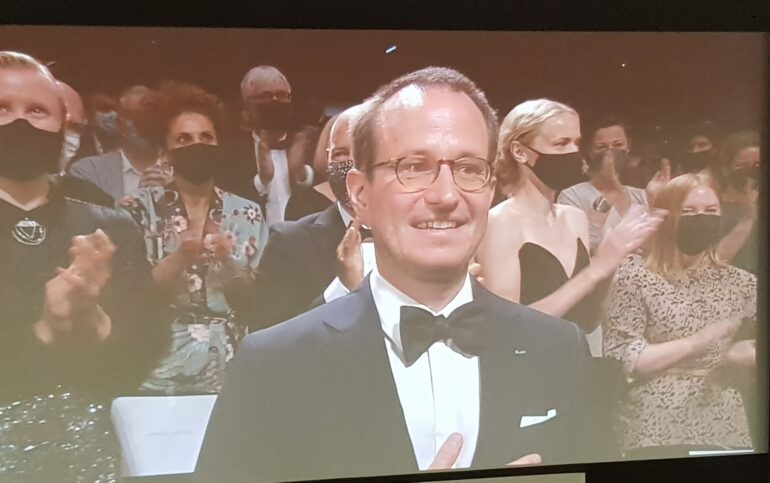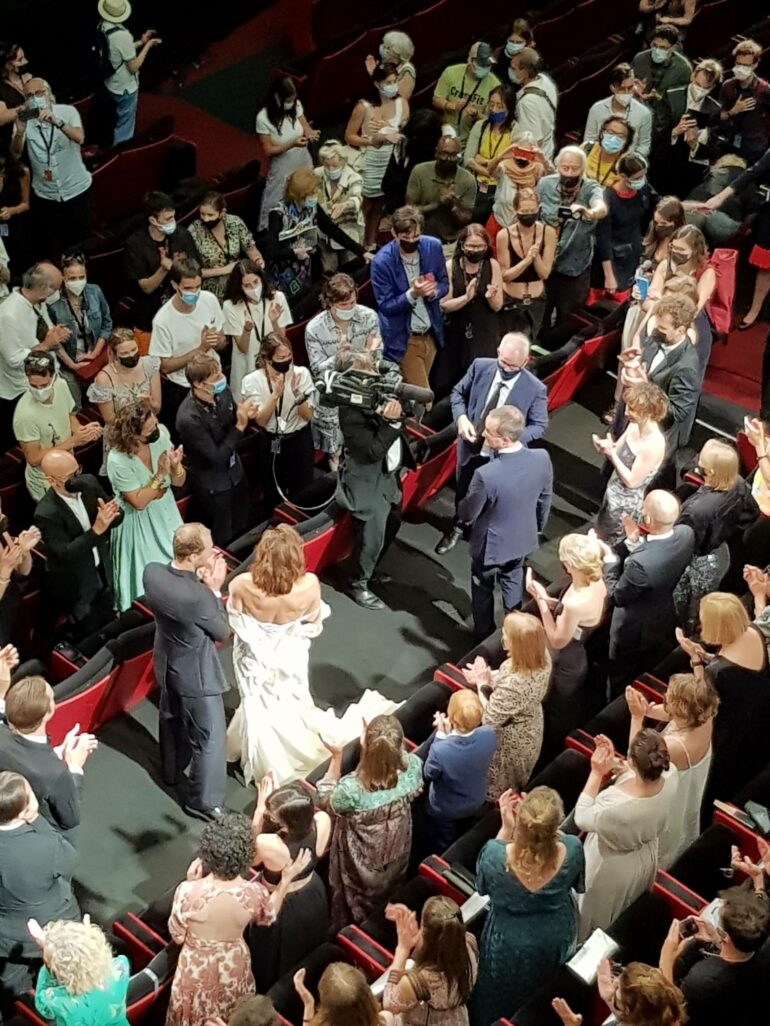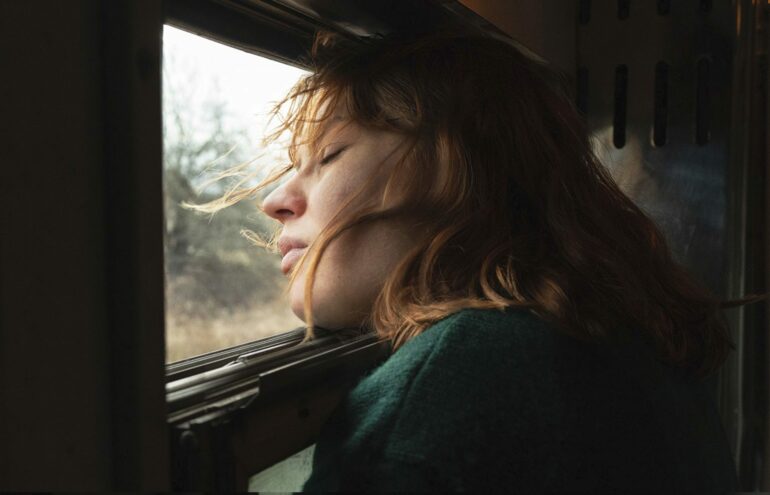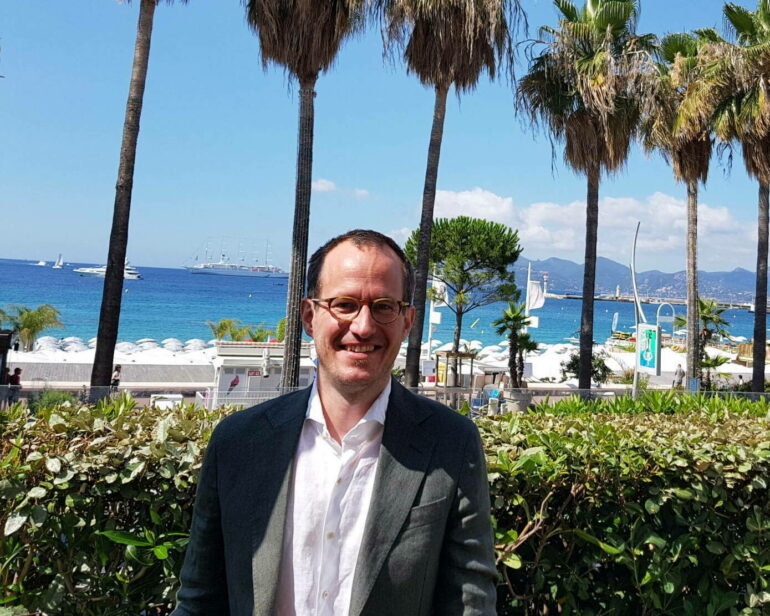WRITTEN BY: Annika Pham
Cannes 2021: The film had its world premiere on Saturday in Cannes, 10 years and two months after Aki Kaurismäki represented Finland in the main competition with Le Havre.
An enthusiastic audience at the Grand Théâtre Lumiere greeted the film’s team with a long applause after its world premiere on a hot Saturday afternoon. “I won’t pronounce any curse word as my mum is here, but ….Thank you Thierry Frémaux for this wonderful festival that is back in force! said Kuosmanen, moved by the warm reception at the end of the screening.
Reviews in the trade press were generally positive. While Screendaily gave it 2 stars, Hollywood Reporter described it as a “melancholic drama but also one that’s unexpectedly uplifting in its insights into human solitude and connection.” Deadline underlined its “vivid emotional twists and turns”, and Variety called it a “deeply delightful Cannes competition.”
Written by Kuosmanen, Estonian writers Andris Deldmanis and Livia Ulman based on Rosa Likson’s eponymous novel, Compartment No. 6 is a chance encounter between two opposite people on a train that will change their perspective on life.
After leaving her lover in Moscow, the young Finnish woman Julia boards a train in Moscow to the arctic port of Murmansk, northwest Russia, in the hope to see the famous ancient petroglyphs. Forced to share the long ride in compartment no 6 with the loud, philistine Russian miner Ljoha, she gradually warms up to his relentless attempts to provoke her and a true connection eventually develops between the unlikely duo.
In the title roles are Seidi Haarla (Force of Habit, Love & Order) and Russia’s Yuriy Borisov, starring as well in Kirill Serebrennikov’s Cannes competition entry Petrov’s Flu.
The film was produced by Finland’s Jussi Rantamäki & Emilia Haukka of Aamu Film Company, in co-production with CTB Films, Russia, Amrion Production, Estonia, and Achtung Panda, Germany, with support from the Finnish Film Foundation, YLE, ARTE, the Estonian Film Institute, the Ministry of Culture of the Russian Federation, MEDIA Programme, Eurimages and Nordisk Film & TV Fond.
B-Plan Distribution which also handles Finland’s Critics’ Week entry The Gravedigger’s Wife, will release Compartment No. 6 domestically later this year. The film is sold worldwide by Paris-based Totem Films.
We sat down yesterday with Juho Kuosmanen at the Scandinavian Terrace in Cannes:
What attracted you to Rosa Likson’s novel in the first place, although it seems like you’ve taken quite many liberties with the original text, as the story in the book took the protagonists from the crumbling Soviet Union to Mongolia and was set in the 80s. Here they go to Murmansk and the era seems to be the 90s …
JK: I’ve always been fascinated by trains, as well as Russian sceneries on an aesthetic standpoint. Rosa’s book actually happens in a train, in Russia and the main character is Finnish-it felt like a perfect combination.
I was basically able to adapt the book because Rosa [likson] told me to take ownership of the story-the book is mine-the film is yours! she said.
Together with screenwriters Andris Feldmanis and Livia Ulman, we initially spent a few years setting the story on a train from Russia, Mongolia to Ulan Bator, set in the Soviet Union in the mid-80s, but when we did the location scouting in Russia, I realised that it didn’t make sense to keep the time in the 80s. It would have been quite costly and complicated. Therefore we changed the decade, the destination, even the age and name of the main male character. Ultimately we changed quite many things, but the essence is there and the main themes.
You’re mentioning themes-what were those that interested you most in this film? Acceptance of yourself and others? Everything seems to separate Laura and Ljoha, yet they gradually feel attracted to each other…
JK: Yes. At the beginning, Laura pretends to be upper-class, that she is studying archaeology. At the same time Ljoha hides behind the alcohol, toxic masculinity, but gradually the roles they are playing are falling down They let go of their protective walls and at the end, they are like long lost siblings, and extremely close to each other.
Their cultural and linguistic differences make it for nice humoristic touches in the film…
JK: I get bored if I can’t laugh. It’s part of my filmmaking style. Together with my cinematographer J-P Passi, we don’t just share the same ideas of filmmaking, we also connect strongly on the level of humour. So there are slapstick elements, anecdotes throughout the film. At the same time, the film has strong emotions as it deals with loneliness as well.
The scene where Yuri takes Laura to an elder woman in the middle of the night is very touching. What is the meaning of this encounter? The elderly woman is a bit like a fortune-teller who sees through Laura…
JK: The lady, who is not an actress, is a kind of foster-mother to Ljoha, He wants to introduce Laura to this lady to show that he is appreciated as a human being, that he is a good person. It’s a scary place, they drive in the middle of the night, but nothing bad happens to Laura and she starts to trust him.
How did you cast Seidi Haarla and Yuri Borisov?
JK: Seidi was the first option for this role as we were looking for Russian-speaking actresses. I love her humour, craziness, and we have a constant trust. She has a strong physical presence and at the same time, she has a fertile soul, which is how she connected so well with Yuri.
Yuri is an amazing actor, and I as soon as I saw him play against Seidi, I saw twins. They were able to express the unexpected connection that ties the two characters.
How was the filming in the confined space of a train?
JK: The hardest was to check the actors from a monitor in another compartment - number 7- as there was no space to be in the same compartment. When you are watching the actors with your own eyes, it’s easier to focus on the situation, the atmosphere, but when are behind a monitor, you start to direct the surface of the image-that was tough.
How was it to have the world premiere of the film in the 2,000 seater Grand Théâtre Lumière in the main competition?
JK: It’s been amazing, especially during the pandemic year, after waiting for the festival to happen, for cinemas to reopen in Finland-the magic of watching a film on a silver screen is unique.
I have a special bond with Cannes. While it’s the most prestigious festival in the world, there is something cosy about it. It is the first festival I attended in 2008 with my short film Roadmarkers, at Cinéfondation, then again at Cinéfondation in 2010 with The Painting Sellers and my first feature [The Happiest Day. In the Life of Olli Mäki] In 2016 at Un Certain Regard. It might sound arrogant, but being in competition in Cannes didn’t feel like stepping into something unknown.



